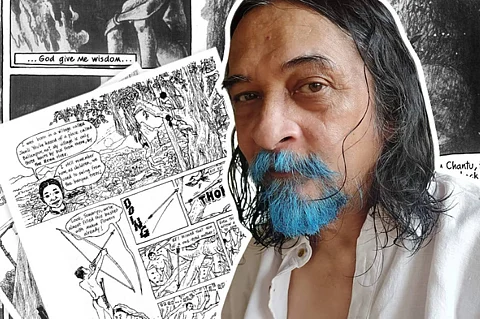
- HOMEGROWN WORLD
- #HGCREATORS
- #HGEXPLORE
- #HGVOICES
- #HGSHOP
- CAREERS
- ABOUT US
- CONTACT US

From the witty genius of Tenali Raman to the fascinating computer-like brain of Chacha Chowdhury; from the historical lessons in Amar Chitra Katha to the magical world of Panchatantra — comic books evoke a sense of nostalgia among us 80s and 90s kids. With their visual appeal and fast-paced writing, they have this incredible ability to transport the readers into a completely different world.
As a young reader, I would often spend hours admiring a panel, studying the characters, and even try sketching a figure, with a resemblance to what I imagined my superhero form to look like. As I grew older, I swayed a little away from Indian comics and delved deeper into the world of manga and graphic novels. Oh, what wonders awaited me! I discovered the dark, gritty world of legendary Japanese manga artist, Junji Ito and the massively rich and diverse worlds of Neil Gaiman. For the longest time, I believed that such culturally polished graphic novels were a predominant domain of the west until I was introduced to the works of Orijit Sen and his magnum opus ‘River of Stories’.
Orijit Sen was born in 1963 and is one of the pioneering figures in the Indian graphic novel movement. Graphic novels, as a literary form, were introduced in India in 1994 when the first Indian graphic novel, ‘River of Stories’ was published. It is a starkly political text covering the controversial issue of constructing the Narmada Dam. It contains colliding narrative voices of a fictional character and simultaneous narration of the story of the Narmada river and of the Adivasi communities surviving off it. It is a documentation of the Narmada Bachao resistance movement weaved through folklore and stories of the Adivasi people.
Early in life, Orijit Sen realized the power of artists to ‘transform something very painful into something very beautiful - through music, literature, poetry, and visual art.’ His inspirations include Guevara, Frantz Fanon, and artists like Goya, Mayakovsky, and Chittoprosad. He believes that their art could outlive their corporeality. This propelled him to create and belong to the joyous world of art.
Orijit Sen says: “I feel that an artist’s true calling is to engage the outer and the inner worlds and build bridges between them. His or her individual, inner experiments and explorations remain incomplete till it is expressed in the outer world in some form, and tested in the fires of society. We are all trapped in a world driven not by grace and truth but by greed and injustice. As an artist, I cannot be fully happy while the society around me is sick. That connection is what drives much of my work. I try to distill my anger and despair into something that has the power - to reveal, move and inspire.”
In an interview with the Hindustan Times, Sen mentioned that back in his youth, there was a community lacking comic artists. In today’s world, that is no longer the case. Comics, manga, and graphic novels are in vogue and their readership has also increased widely in India. Initiatives like Indie Comix Fest have bridged this gap between the idea of comics only being in the Western domain. It is a non-profit, artist-run festival of self-published comics in India. The festival is held in all the major cities such as Bangalore, Delhi, and Kolkata. This year, In Delhi there were over fifty artists showcasing and selling their work at the festival held at Goethe Institut, with over five hundred visitors. It was a one-page comic challenge and thousands of unique entries were received out of which only a few could be displayed. The event also featured an interesting workshop by Orijit Sen focusing on anthropomorphism in comics, titled ‘Spirit Animals And Other Humans’.
This generation of comic readers and creators is more politically aware, as all literature lovers ought to be and India has some amazing visual artists working with graphic novels and comics. We must explore their works and not solely rely on western artists and writers. It is in this light that Orijit Sen’s River of Stories makes a return to the bookstores as a hardcover after twenty-five years. Brought to you by Blaft Publications, it is a must-read for all literature fans.
You can pre-order the 25th anniversary edition of ‘River of Stories’ here.
If you enjoyed reading this, we suggest you also read:
A Homegrown Guide To Delhi’s Most Unique Comic Book Stores
Graphic Designers Tapping Into Eccentric Storytelling & Mesmerising Visuals
